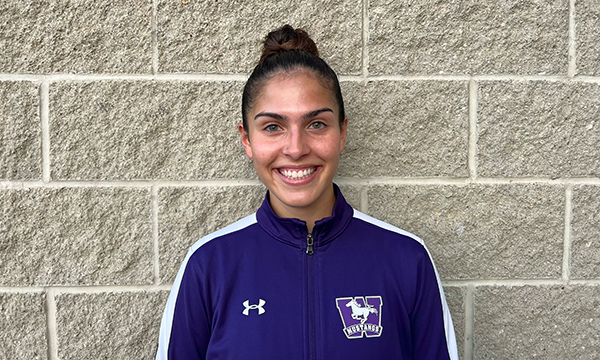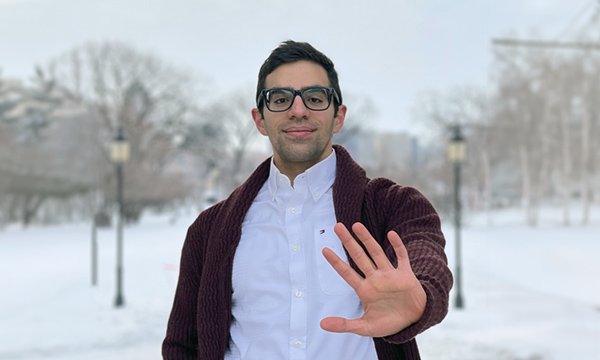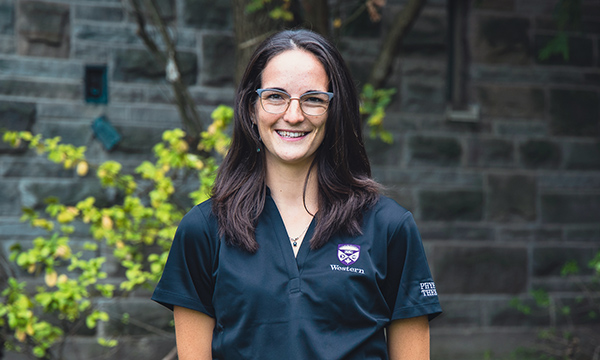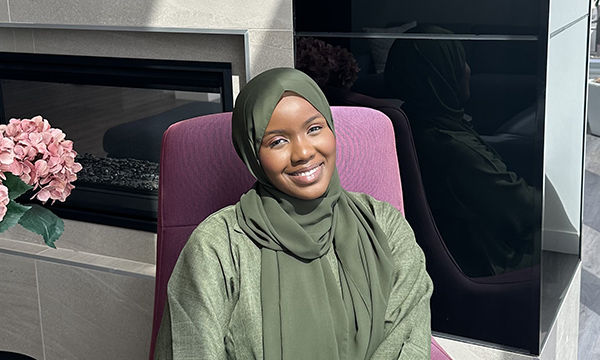Meet our Students
Lyanne
Brampton, ON

Wanting to take a hands-on approach to physiotherapy, Lyanne chose Western for it's comprehensive and practical methods.
Why did you pursue a degree in Health Studies?
Pursuing a career in rehabilitation has been a passion of mine from an early age. I have experienced first-hand how imperative physical therapy can be to make me feel my best both on and off the field. I have witnessed the tremendous impact physiotherapy can have on individuals across their lifespan; and after many volunteer and working opportunities, I knew I wanted to take a hands-on approach to rehabilitation. I was intrigued by the wide scope of practice and settings in which physiotherapy can exist and knew that the MPT program would provide the exposure and knowledge to explore this further. I am dedicated to helping others live life to their fullest and reach their potential in and out of the clinic.
Why did you decide to study at Western?
I chose Western University because it offered the most comprehensive and practical approach to Physical Therapy. The case-based and experiential learning environment prepares learners to practically apply their knowledge from the very beginning. Their mission to create innovative and adaptive learners for today and into the future aligned with my vision to help others and to meet the growing demands of our dynamic society.
The emphasis on orthopaedics, manual therapy and case-based clinical reasoning was a large contributor to my decision to study at Western. I have a passion for working with athletes and the connection to the internationally renowned Fowler Kennedy clinic, set Western University above the rest. Having the opportunity to learn from the best educators and practitioners across the various settings of physiotherapy is invaluable to me as a future physiotherapist.
What is your most memorable experience in the program?
I have had many memorable experiences thus far, but the most important has been the connections with others. I have enjoyed getting to work with such ambitious, knowledgeable, and hardworking individuals. From peers and teammates to professors and clinical instructors, I have developed great professional and personal relationships and have learned such valuable lessons from all. I have balanced being an athlete on Western’s Women’s Lacrosse Team, attending networking and volunteering events, guest lectures and staying on top of my coursework. This is all possible, because of the supportive community in the MPT program and the frequent spikeball games at lunch. This program has presented amazing ways to network, learn, and grow beyond the classroom. Clinical placements have provided some of the best practical experiences and opportunities. I have had the unique opportunity to observe orthopaedic surgeries prior to working with patients in the clinical setting; this provided greater insight and increased my understanding of post operative rehabilitation. These experiences have strengthened my passion for working with athletes across the lifespan and working in a profession that can have such a positive impact on an individual’s quality of life. I look forward to enhancing my rehabilitation knowledge and continuing with placements, specifically with an international placement in Australia in the New Year.
How will your work change the world?
With the skills I have learned throughout my extensive educational career, I see myself able to educate, treat and guide individuals to achieve their goals, improve their confidence and return to the activities they love.
After graduation, I see myself working in a clinical setting with athletes in life and in sport and volunteering with local sports teams and organizations. Western has prepared me with extensive orthopaedic and MSK knowledge, clinical reasoning, and manual therapy skills to provide the required care to rehabilitate athletic populations. I plan to continue to expand my skills, knowledge, and services within the field of physiotherapy through the CPA-ortho-division, and SPC certification courses, to name a few.
In addition to clinical practice, I would love the opportunity to give back to the community that helped develop my passion for sport and rehabilitation. I have had the most amazing mentors and teachers throughout my educational career and would like to create education, support, and mentorship opportunities for individuals interested in sports and rehabilitation. I would like to inspire individuals to pursue sports rehabilitation and to create spaces that welcome curiosity and create opportunities to grow.
Promoting movement as medicine is a main value in my life and practice. I believe that through my work as a future physiotherapist, I will be able to change the world, one person at a time, by helping them to be the best version of themselves.
Amin
Tehran, Iran

Amin looks forward to delivering evidence-informed care as well as increasing accessibility to physical therapy, especially for BIPOC communities.
Why did you pursue a degree in Health Studies?
From an early age, I would see my martial arts Sensei treat and heal those present with the given training and afterwards where necessary respectively. It was then during the care that my mother received which prevented, what I now know to be, a lumbar discectomy, that it rendered the integral role that physical therapists carry within our healthcare system. My experiences as an educator and instructor have made me privy to the inadequacies of accessing physical therapy care and often the lack of awareness around what our field offers has kept individuals from receiving the care they deserve. The fervor for physical therapy as a means of community service serves as my guiding principle to optimize my learning and share what I am learning here.
Why did you decide to study at Western?
The chance to learn from the instructors here at Western within the case-based construct is a factor that I value greatly. An institution that highly values EDID principles, the MPT program employs an educational approach that not only excels in ensuring its members are well-versed in contemporary principles and effectively highlights the essence of physical therapy within its breadth of scope. Today, as a proud member of the Elborn College community, I aim to carry forward the teachings of esteemed instructors like professor Heather Gillis and effectively share their given lessons. Although, the standout feature of Western's MPT program may lie in its emphasis on manual therapy education, it is the ongoing commitment to the development of each individual that truly distinguishes this program.
What is your most memorable experience in the program?
During our Rehab-1 course, I was exposed to the field of Amputee-Rehabilitation and the given training methodologies for prosthesis-based gait training. Often society tends to gratuitously cast its misconceptions about disability, such that each person’s uniqueness is made silent. When meeting Darda Sales, Olympian gold medalist and recreational therapist, she epitomizes how far-reaching each of us can climb with our given intuition. Darda’s story and professor Folarin Babatunde’s teachings illustrated the profound place that we as physical therapists can have, not only via our hands-on involvement in given therapeutic treatments, rather to holistically aid an individual’s growth. This is a mere example of the atmosphere and given essence of the instructors here at the MPT program at Western who tirelessly work in exemplifying the role delegated to us within our communities as physical therapists.
How will your work change the world?
With the support of my community, I intend to create an inter-disciplinary institution that can be a part of the current pan-Canadian movement in progressing the field of physical therapy. My plan is to contribute to the delivery of evidence-informed care, while making the resources we provide readily available among low-resource settings. As an international student, I recognize the challenges surrounding access to care for BIPOC communities. Thus, I intend to set a framework for both guiding where necessary research is required and providing care within the construct of mutual reciprocity, such as addressing the rise in diabetes among Manitoba’s Indigenous peoples.
Hana
Antigonish, Nova Scotia

Hana plans to be a clinician scientist, incorporating both clinical practice and a research program while working in a physiotherapy/sport medicine setting.
Why did you pursue a degree in Health Studies?
I have always been fascinated with the body’s ability to move and adapt to our lifestyle and chosen activities. I think that physical activity is so important for mental and physical health, social relationships, and letting people find fun in their lives. I hope that through a career in physiotherapy, I can encourage people to be active in a way they enjoy. I spent a lot of time in physiotherapy growing up competing in figure skating, track and field, and cross country and I really appreciated the relationships with my physiotherapists and their ability to keep me doing what I loved. I also saw the significant negative effects that injuries had on friends and teammates around me, and I always wanted the skills and knowledge to be able to help them through those tough times. I am so looking forward to being able to provide this to patients now that I have completed the MPT program!
Why did you decide to study at Western?
I chose Western because of the combined MPT PhD program that I am currently completing. While I knew I wanted to be involved in physiotherapy, I also loved the research experiences I had during my undergraduate degree and couldn’t decide whether I wanted to pursue a clinical or research path in the field. Fortunately, I was accepted into the combined program at Western which has allowed me to keep both doors open. Additionally, Western University and the Fowler Kennedy Sport Medicine Clinic are well known for both their clinical practice and research in orthopaedics, musculoskeletal health, and sport medicine, so I knew it would be a perfect setting to explore my interests.
What is your most memorable experience in the program?
Three things stand out in my mind over my time in the program so far. Firstly, my clinical placements in the MPT program have been the most impactful on my learning. While not the type of physiotherapy practice I intend to pursue, my placement in an ICU was eye-opening and meaningful and really made me appreciate the breadth of the physiotherapy scope. My last placement at the Fowler Kennedy Sport Medicine clinic confirmed my desire to work in a sport medicine clinic and help keep people active. Secondly, through my graduate studies I have had the opportunity to attend monthly clinical and research rounds at the Fowler Kennedy Clinic. These sessions have been integral in my learning and comfort level with a multi-disciplinary group of health care professionals (primary care physicians, orthopaedic surgeons, physiotherapists). Lastly, I have had the opportunity to present my PhD work at multiple international conferences which has brought me critical exposure to new research, connections with collaborators, and always ignites my passion for research.
How will your work change the world?
My overall goal is to be a clinician scientist, incorporating both clinical practice and a research program into my career. I hope to work in a physiotherapy/sport medicine setting specifically aiming to improve treatment and rehabilitation following musculoskeletal injuries and orthopaedic surgeries, using a biopsychosocial approach, and incorporating my patients’ voices into research. Following completion of the combined MPT/PhD degree, I plan to pursue a postdoctoral research fellowship investigating psychological factors related to recovery following anterior cruciate ligament injury and reconstruction. I hope to identify psychological interventions that can be incorporated into physiotherapy rehabilitation to improve individual’s confidence and readiness to return to sport and/or activity and reduce fear after these significant injuries. My other research interests include injury prevention and how to best measure what is important to patients during recovery. Clinically, I hope to hone my skills in sport medicine with two specific areas of interest currently being treating and preventing ACL injuries and running related injuries. I hope to make a difference in the world through collaboration, evidence production, and evidence based practice so people can stay active in ways they enjoy.
Salsabila
Kontagora, Nigeria

Salsabila understands the how important it is for immigrants, women and people of colour to have the option of a practitioner who can relate to cultural differences in our society.
Why did you pursue a degree in Health Studies?
I took a year off secondary school and was indecisive as to what I would study in university. I had an ability in all sciences and thought it would be logical to pursue a degree in this field. The most important thing to me was that I felt like I made an impact and when I explored my options, I felt like physiotherapy spoke the loudest to me.
Why did you decide to study at Western?
Western was one of the few schools in Canada that accepted international students into a Canadian Master's degree in Physical Therapy program. I like the case-based approach of the program and Western is widely known for its excellence in musculoskeletal physical therapy. Western University's strong focus on equity, diversity and inclusion was also a big deal to me.
What is your most memorable experience in the program?
I would say the most memorable day was my first day in the program when I realized how important diversity was in every situation. I am a black Muslim woman, and I guess I never realized how important my identity was until I was in that space. I leaned towards neurorehabilitation research, but I have since embraced the idea of going into general MSK, pelvic health and pediatrics because it is important that people who look like me find representation in the health system. I feel like it is important for immigrants, women, or people of colour to have the option of a practitioner who can easily relate to and understand the cultural differences that exist in our society.
How will your work change the world?
While I expect my physiotherapist career will begin in Canada, I plan on going back to my home in Nigeria. I would love to join a NGO and practice in rural areas to provide healthcare. I want to make as much of a change as possible in my hometown because while I am grateful for the education I am receiving in Canada, I believe we are nothing without where we originate from.

